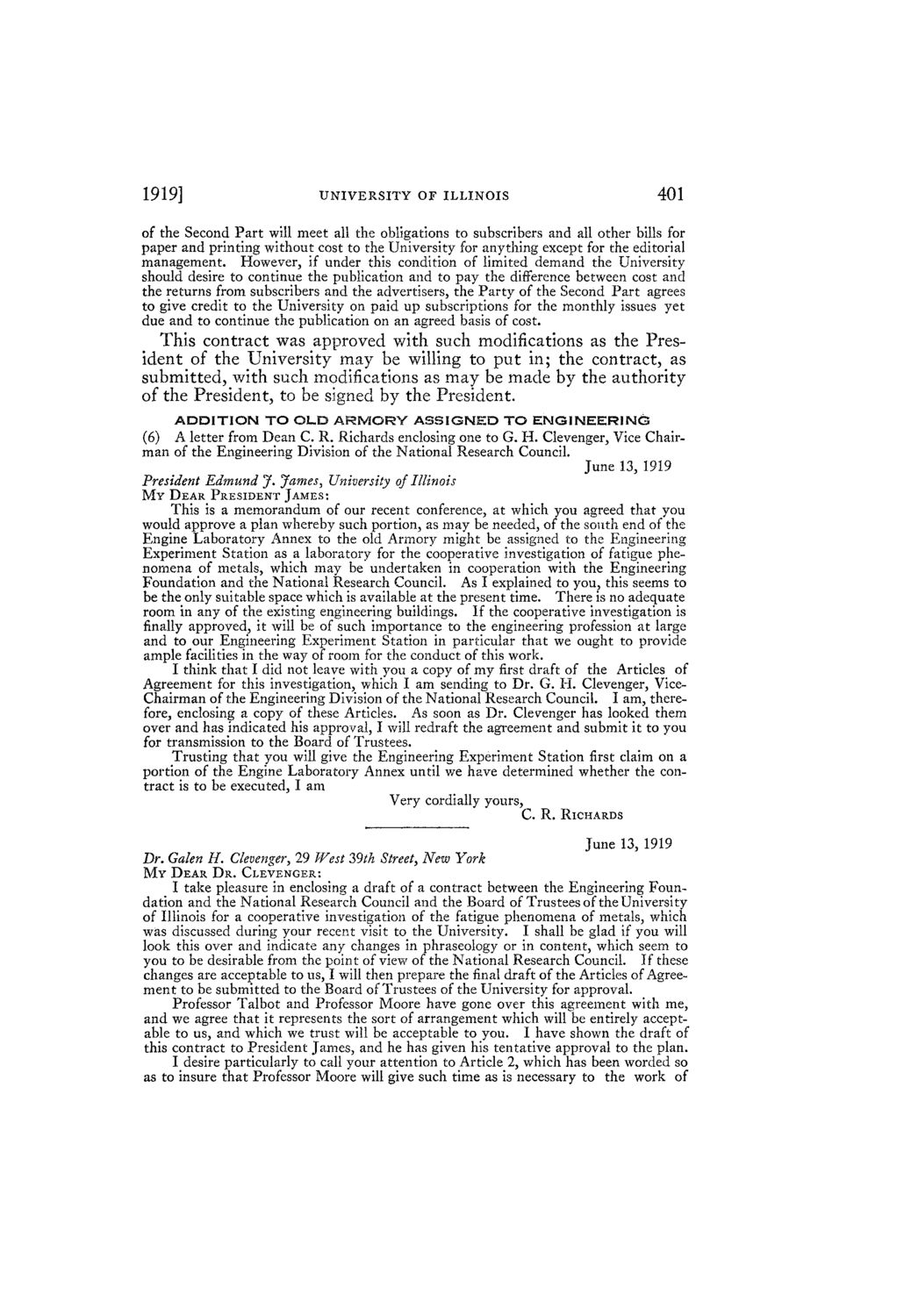| |
| |
Caption: Board of Trustees Minutes - 1920
This is a reduced-resolution page image for fast online browsing.

EXTRACTED TEXT FROM PAGE:
1919] UNIVERSITY OF ILLINOIS 401 of the Second Part will meet all the obligations to subscribers and all other bills for paper and printing without cost to the University for anything except for the editorial management. However, if under this condition of limited demand the University should desire to continue the publication and to pay the difference between cost and the returns from subscribers and the advertisers, the Party of the Second Part agrees to give credit to the University on paid up subscriptions for the monthly issues yet due and to continue the publication on an agreed basis of cost. This contract was approved with such modifications as the President of the University may be willing to put in; the contract, as submitted, with such modifications as may be made by the authority of the President^ to be signed by the President. A D D I T I O N T O OL.D A R M O R Y A S S I G N E D T O E N G I N E E R I N G (6) A letter from Dean C. R. Richards enclosing one to G. H. Clevenger, Vice Chairman of the Engineering Division of the National Research Council. June 13, 1919 President Edmund J, James, University of Illinois M Y DEAR PRESIDENT JAMES: This is a memorandum of our recent conference, at which you agreed that you would approve a plan whereby such portion, as may be needed, of the south end of the Engine Laboratory Annex to the old Armory might be assigned to the Engineering Experiment Station as a laboratory for the cooperative investigation of fatigue phenomena of metals, which may be undertaken in cooperation with the Engineering Foundation and the National Research Council. As I explained to you, this seems to be the only suitable space which is available at the present time. There is no adequate room in any of the existing engineering buildings. If the cooperative investigation is finally approved, it will be of such importance to the engineering profession at large and to our Engineering Experiment Station in particular that we ought to provide ample facilities in the way of room for the conduct of this work. I think that I did not leave with you a copy of my first draft of the Articles of Agreement for this investigation, which I am sending to Dr. G. H. Clevenger, ViceChairman of the Engineering Division of the National Research Council. I am, therefore, enclosing a copy of these Articles. As soon as Dr. Clevenger has looked them over and has indicated his approval, I will redraft the agreement and submit it to you for transmission to the Board of Trustees. Trusting that you will give the Engineering Experiment Station first claim on a portion of the Engine Laboratory Annex until we have determined whether the contract is to be executed, I am Very cordially yours, C. R. RICHARDS June 13, 1919 Dr. Galen H. Clevenger, 29 West 39th Street, New York M Y DEAR D R . CLEVENGER: I take pleasure in enclosing a draft of a contract between the Engineering Foundation and the National Research Council and the Board of Trustees of the University of Illinois for a cooperative investigation of the fatigue phenomena of metals, which was discussed during your recent visit to the University. I shall be glad if you will look this over and indicate any changes in phraseology or in content, which seem to you to be desirable from the point of view of the National Research Council. If these changes are acceptable to us, I will then prepare the final draft of the Articles of Agreement to be submitted to the Board of Trustees of the University for approval. Professor Talbot and Professor Moore have gone over this agreement with me, and we agree that it represents the sort of arrangement which will be entirely acceptable to us, and which we trust will be acceptable to you. I have shown the draft of this contract to President James, and he has given his tentative approval to the plan. I desire particularly to call your attention to Article 2, which has been worded so as to insure that Professor Moore will give such time as is necessary to the work of
| |